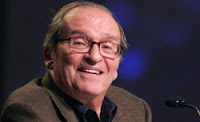He's been one of my favourite filmmakers for years and someone I'd wistfully hoped to meet one day, so it was with a genuinely heavy heart that I learned Sidney Lumet had passed away in April at age 86.
Director of a bundle of personal favourites like Network, Dog Day Afternoon, Serpico, and The Verdict, Lumet represented that old-school mix of irrepressible passion, inexhaustible work ethic, and an unrivaled ability to troubleshoot production problems while still bringing films in on time and often under budget.
I've soaked in the sunlight of his movies for years, but I fell in love with him this past spring by reading his memoir, Making Movies. Admittedly (and unapologetically) an actor's director, Lumet always cared as much about the co-creators of his vision as he did about the original material or the finished product. At once a diary and a technical analysis, the book moves through the various stages and elements of filmmaking in a style so comprehensible and intimate, a reader could easily mistake himself or herself as being on set and part of the process.
 Nothing essential gets missed. Not only directing, writing and acting, but art direction, costume design, editing and scoring receive the full-chapter treatments they deserve, breaking the sum into its various parts so respectfully (and helpfully to an aspiring filmmaker), there is simply no room for ego by the time he is done. Films are so clearly a collaborative effort, and Lumet is so clearly willing to share glory where it is deserved, one cannot help but appreciate the sheer magnitude of the profession he chose and the kind of individual he needed to be in order to execute his vision so well, so often. Lumet was a skilled and talented director to be sure, but more than this he was a truly authentic, deeply personable, refreshingly honest human being committed to transferring his experiences and insights to anyone willing to learn.
Nothing essential gets missed. Not only directing, writing and acting, but art direction, costume design, editing and scoring receive the full-chapter treatments they deserve, breaking the sum into its various parts so respectfully (and helpfully to an aspiring filmmaker), there is simply no room for ego by the time he is done. Films are so clearly a collaborative effort, and Lumet is so clearly willing to share glory where it is deserved, one cannot help but appreciate the sheer magnitude of the profession he chose and the kind of individual he needed to be in order to execute his vision so well, so often. Lumet was a skilled and talented director to be sure, but more than this he was a truly authentic, deeply personable, refreshingly honest human being committed to transferring his experiences and insights to anyone willing to learn.I particularly enjoyed his rationale for determining which ideas deserved cinematic treatment: "I'm not a believer in waiting for 'great' material that will produce a 'masterpiece.' What's important is that material involve me personally on some level. . . As long as the theme is something I care about at the moment, it's enough for me to start work." Of course, years of theatre and television work prior to entering Hollywood undoubtedly helped educate his choices regarding what was both intuitively satisfying and commercially viable. Nonetheless, it is always refreshing to hear a filmmaker talk as much about a story's human impact as it's technical achievement or box office potential.
Punctuated with anecdotes featuring actors like Henry Fonda, Marlon Brando, Paul Newman, Faye Dunaway, and his obvious favourite (and mine), Al Pacino, Making Movies strips the filmmaking industry, if only temporarily, down to its most basic elements: a process and a community of people deeply invested in making that process work. This is not a book by an "expert" who writes about film; this is an enthralling and highly personal guided tour through a career with no guarantees and no end of adventure by someone who's been there, over and over again.
"Nobody knows what the magic combination is that produces a first-rate piece of work," wrote Lumet. "I'm not being modest. There's a reason some directors can make first-rate movies and others never will. All we can do is prepare the groundwork that allows for the 'lucky accidents' that make a first-rate movie happen."
Would love to have heard more about those "lucky accidents", Sidney. But thanks so much for putting some of them down on paper before you left.


















0 comments:
Post a Comment